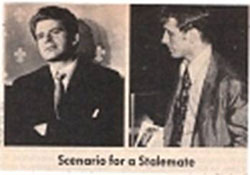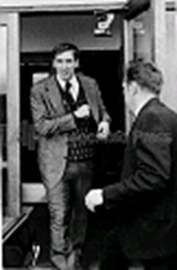A great moment in chess (Part 4)
By Prof. Christian Hesse

Ultimately chess is just chess - not the best thing in the world
and not the worst thing in the world, but there is nothing quite like it. – W.C. Fields
Part 3 of our series “A great moment in chess” ended with the events in Reykjavik on Thursday, July 13, 1972 at 6:00 p.m. when the main referee Lothar Schmid declared a forfeit due to Fischer's non-appearance in the playing hall. Spassky, who had sat at the table waiting for Fischer for an entire hour, walked back-stage and could be heard muttering: “It is a pity, a great pity.”
Thorarinson, the chief organizer of the mach, was in a depressive mood, expecting the match to be over. There was only one thought which raised a little hope. ”Bobby is a fighter. How can he quit with Spassky ahead?”

Picture and headline in the New York Times |
Still, most journalists had made plane reservations to leave the island. The view that Fischer's behaviour was disgraceful was almost held unanimously, even among Americans. Some were apologizing to Icelanders in the name of their country. One US-citizen said: “Fischer is the only guy that gets every American rooting for the Soviet Union.”
The events unfolding in Iceland continued to make front-page headlines. The Washington Post wrote that “Fischer had alienated millions of chess enthusiasts around the world.” The New York Times gave extensive coverage to the “stalemate” in Reykjavik, to name only two examples.
Bobby Fischer formally protested the forfeit with a long letter to Lothar Schmid delivered by him in person in the early hours of July 14 to Schmid's hotel room. Another of Fischer's lawyers, Andrew Davis, arrived a few hours later from the US to convince members of the Match Committee to overrule Schmid's forfeit-decision. The committee met at 10 a.m. the same day. It upheld the referee's ruling.
After this ruling, Fischer asked Fred Cramer, his chief assistant in Reykjavik, to prepare for him to leave Iceland. Shortly afterwards, he holds a reservation for the 3:15 p.m. flight to New York on July 17. Fischer told Cramer: “I want you to pick up those tickets tonight and bring them up here to me. Then I want you to figure out some plan to sneak me out to the plane.They might try to stop me, you know. It has got to be secret.”
While all this is going on, Henry Kissinger is in San Clemente, California, involved in several rounds of extensive talks with the Soviet ambassador Anatoly Dobrynin during a US-Soviet summit. At some stage during the day he found the time to place a phone call to Reykjavik 22322, the number to reach Fischer. In addition, many telegrams arrived for Fischer urging him to play on.

Lothar Schmid (right) during the Spassky-Fischer match in 1972
That same day, Fischer had an afternoon meal with an elderly lady, Lina Grumette, that he knew from many years back in California. She later said: “I gave him hell. I told him if he walked out of the match he'd be washed up. He'd be a dirty word everywhere chess was played. Oh, I really laid it into him. He listened very seriously. He didn't say he'd play, but I shook him up and I think he was glad.”
On the afternoon of July 15, a wire arrived for Lothar Schmid: “In case of non-appearance Fischer in third game President FIDE decides as follows stop if Fischer for fourth game does not appear match will be concluded and Spassky proclaimed World Champion stop Euwe”
It is hard to say what eventually did make the difference. Maybe it was Kissinger's phone call or Lina Grumette's dinner conversation or the content of the telegrams or perhaps a combination of all of these things. His lawyer Paul Marshall later said: “Bobby had the same fear of leaving Iceland as he had of coming to Iceland. When it came to a decision, he was less afraid of playing than he was of the unknown. But make no mistake, he was terrified of playing.”
Fischer is known to have made the decision to continue almost at the last minute, sometime early afternoon on Sunday, July 16, the day scheduled for game three. He had earlier asked Cramer to change his reservation to the last plane leaving Reykjavik that day. Around 3 p.m. Cramer knocked on Fischer's door to pick him up for the flight. His second William Lombardy opened the door, Paul Marshall also being in the room, the telegrams being scattered all over.
Fischer: “That two-game edge is gonna make it hard. But I can still do it, you know.”
Marshall: “I know you can, Bobby.”
Fischer: “All right. But you have to get me in that back room.”
Marshall acted by phoning Schmid, telling him that Fischer had agreed to play if game 3 was held in a small, thirty-by-sixty foot separate room at the back of the stage without cameras, out of view from the spectators in the main hall. It was normally used for ping-pong. The Amsterdam Agreement, signed by both players, stated that a game could be moved to this room if there was a disturbance in the main hall. But since there was no disturbance, Schmid considered himself to be acting beyond his authority if he simply moved game 3 there. He had to get Spassky's approval. He called the Champion immediately. Spassky said: “Pozhaluista” (That's o.k. with me.) He took the decision without conferring with his team. The team members found out only when they took their seats in the main auditorium. Spassky had felt he had to give Fischer something in return for the free point.
Not much later, a few minutes before 5 p.m., Lothar Schmid was in the ping-pong room. It did not contain much more than a chrome and black chair for Fischer and a simple armchair for Spassky as well as a playing table.

2005: Fischer at the original 1972 Fischer vs Spassky table in Reykjavik
Schmid opened a window. The sound of children playing outside could be heard. Spassky arrived shortly afterwards and looked around for Fischer. But he was not there. Spassky sat down at the chessboard. Then Fischer arrived. And his eyes fell immediately on a closed-circuit television camera that had been installed in the ceiling to broadcast the game to the large audience in the main hall, the journalists in the press room and the commentators. It had been wrapped in blankets. The spectators had paid five dollars each, and some of them later complained that there was only a TV-screen instead of the real thing.
“No cameras!” Fischer roared. He paced the room back and forth, turning switches on the wall on and off. Schmid asked him to stop since Spassky was being disturbed. “Shut up, Lothar!” Fischer yelled back at Schmid.
Spassky turned white and stood up. Schmid later recalled:”When Bobby yelled at me, Boris became upset and said “If you do not stop the quarrel, I will go back to the playing hall and demand to play there.” Spassky had reached the door already. Schmid was panic-stricken. He pleaded with Spassky: ”Boris, you promised.” Spassky shrugged his shoulders. Schmid turned to Fischer: ”Bobby, please be kind.” Schmid recollects:”I felt there was only one chance to get them together. They were two grown-up boys, and I was the older one. I took them both and pressed them by the shoulders down into their chairs and I said: ”Play chess now!” And almost automatically, Spassky made the first move, 1.d4, the same he had played in game 1.”

Associated Press photo of Fischer
leaving Laugardalsholl Hall after
Spassky resigned Game 3 |
Fischer initially still contemplated whether to stay or whether to leave. But then at 5:09 he took his king-side knight and put it to f6. His desire to play chess had gained the upper hand. The world championship match had been saved. There was tremendous applause from the spectators in the main hall. The players, though, could not hear it.
The events just described constitute the psychologically decisive moment of the entire match. In terms of score, Fischer was two full points behind. In his entire life, he had never beaten Spassky. He had blundered away a drawn position in Game 1. And now he had the black pieces. When he entered that little back-stage room, his face was grey-white almost greenish. But he played that third game for a win virtually from move one onward, introducing an entirely new conception early on. He played that game as if his entire life depended on it. And he won it with very intricate play. It changed the psychology of both players. Fischer had proven to himself that he could beat Spassky. And with black.
On January 21, 2007, Boris Spassky came to Bonn to give a simultaneous display. Before the event, he and Lothar Schmid and Dr. Helmut Pfleger talked in front of a large audience about the events and the psychology of the Reykjavik-match. After the event, a small group of people, including Schmid and the author took Spassky to dinner at a local restaurant.
I could ask him specifically about the situation before the start of Game 3 in Reykjavik. He mentioned that when Fischer started to quarrel with Schmid and told him to shut-up he should have stood up and said: “Gentlemen, I will not play under these circumstances. I am leaving. You can forfeit me but I am not playing. Fischer would have been in a very difficult psychological position. But I missed this opportunity.”
 Spassky vs Fischer in Reykjavik 1972
Spassky vs Fischer in Reykjavik 1972Instead, it took Spassky the entire first half of the match to rebuild himself psychologically. At this stage, though, Fischer had obtained a commanding lead already which was virtually impossible to erase. In the second half, the match was balanced and Fischer rode his lead to a 12.5 – 8.5 final result to become the 11th World Chess Champion.
To be continued
 About the author
About the author
Christian Hesse holds a Ph.D. from Harvard University and was on the faculty of the University of California at Berkeley until 1991. Since then he is Professor of Mathematics at the University of Stuttgart (Germany). Subsequently he has been a visiting researcher and invited lecturer at universities around the world, ranging from the Australian National University, Canberra, to the University of Concepcion, Chile. Recently he authored “Expeditionen in die Schachwelt” (Expeditions into the world of chess, ISBN 3-935748-14-0), a collection of about 100 essays that the Viennese newspaper Der Standard called “one of the most intellectually scintillating and recommendable books on chess ever written.”
Christian Hesse is married, has a six-year-old daughter and a two-year-old son. He lives in Mannheim and likes Voltaire's reply to the complaint: ”Life is hard” – “Compared to what?”.
Previous articles for ChessBase:
























 About the author
About the author




